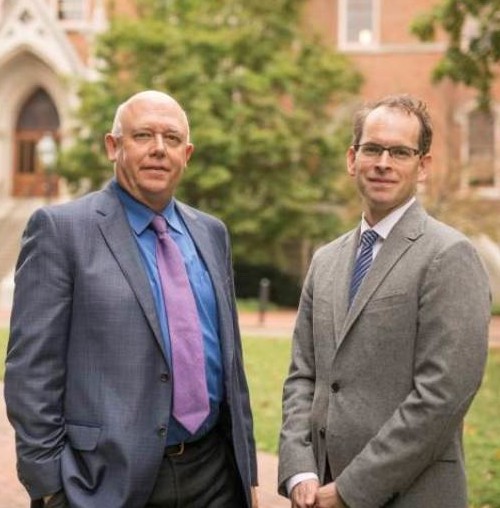Despite opportunities for broad consensus, Tennessee’s long history of pragmatic politics could be affected by rising polarization along party lines, according to the most recent statewide Vanderbilt University Poll.
Poll directors John Geer, Gertrude Conaway Vanderbilt Professor of Political Science, and Josh Clinton, Abby and Jon Winkelried Professor of Political Science, say these findings indicate that the state’s leaders have a choice to make between further strengthening their bases or pursuing a bipartisan agenda.
“What is happening nationally in terms of polarization is beginning to infiltrate state politics,” Geer said. “We’re at a crossroads—going forward, our state leaders can choose to address issues that divide, or issues that unite.”
Signs of retreat from the middle

Like his predecessor, Bill Haslam, Gov. Bill Lee is the most popular politician in the state according to the poll, enjoying a comfortable 61 percent approval rating. Sen. Lamar Alexander stands at 46 percent, while Sen. Marsha Blackburn’s rating is 45 percent. Support for President Donald Trump holds steady at 54 percent. Tennesseans remain unhappy with Congress, giving it just a 26 percent approval rating, though they feel more optimistic about the state legislature, rating it at 52 percent.
These numbers largely align with the previous year’s trends.
However, new patterns are emerging among the supporters of Tennessee’s newly elected officials. At 61 percent, Lee is equally as popular as his predecessor. “But their support base is different.” Geer said. “Lee’s support draws less from Democrats and independents and more from Republicans. This is significant and underscores what could be increasing polarization in the state.”
This trend is even more pronounced among the state’s senators. Support for Sen. Lamar Alexander is essentially bipartisan, according to the poll, while support for incoming Sen. Marsha Blackburn is concentrated almost entirely among Republicans.
“We’re seeing the beginnings of a potential fracture in terms of what direction the state wants to go,” said Clinton. “On one hand, our political leaders could go all in for issues that matter to the Republican base, but which may not be reflective of the views of independents and Democrats. Or they can maintain a more consensus-based approach to policies that voters support broadly.”
Strong bipartisan support for many issues
Despite the possibility of a drift away from consensus policymaking, the poll found Tennesseans unified across several issues:
Drug and alcohol addiction: 69 percent of voters rate it a “big problem.”
Voting access: 66 percent support “motor-voter” policies that automatically register Tennesseans to vote when they get driver’s licenses or interact with other state agencies. Meanwhile, 74 percent would support the restoration of voting rights for Tennesseans with certain felony convictions upon the completion of their sentences.
Health care: Tennesseans strongly support policies related to children’s health—72 percent support the recent “Katie Beckett” law that permits families of severely disabled children to receive Medicaid funding regardless of income level. (By comparison, 60 percent support expanding Medicaid to include more low-income adults.) And 87 percent of voters favor mandatory vaccination for healthy children seeking to attend public schools.
Immigration: Tennesseans strongly favor policies that preserve the rights of illegal immigrants to stay and rectify their status—54 percent say they should be allowed to apply for citizenship, while another 20 percent favor a guest worker program. Furthermore, 62 percent of Tennesseans say efforts to reduce illegal immigration should target employers, not immigrants.
Poll results showed a strong disconnect, however, in Tennesseans’ understanding of how many illegal immigrants reside in the state: While the current estimate is between 120,000 and 140,000, nearly a quarter thought there were more than a million.
House Speaker Glen Casada: Poll results also showed consensus around Casada’s future—63 percent of voters, across all party lines, say he should resign following the revelation of sexually explicit text messages he exchanged with his chief of staff. However, Geer said, that condemnation does not appear to have impacted perceptions of Gov. Lee or the state legislature.
Opportunities for division emerging
“The question is: How hard do you push on those types of issues versus other bipartisan issues like opioids? And I don’t think we know yet. Those fracture lines are there, and it’s going to come down to the decisions our elected leaders make.”
Two bills in the last legislative session highlight the choices the Republican supermajority have to make about how they want to govern, the researchers said.
Though the state legislature recently passed a bill permitting the use of school vouchers in Davidson and Shelby counties, just 40 percent of Tennesseans favor the measure. And while the “heartbeat bill” banning abortions after the detection of fetal cardiac activity failed this session, it would not have found majority support among voters anyway—just 41 percent support such a measure.
“That’s the kind of issue that’s supported by a majority of Republicans, but almost no one in any other group. So the question is: How hard do you push on those types of issues versus other bipartisan issues like opioids?” Clinton said. “And I don’t think we know yet. Those fracture lines are there, and it’s going to come down to the decisions our elected leaders make.”
The poll of 1,000 demographically representative Tennessee voters was conducted May 9-23 via landline and cell phones, and covered a variety of state and national issues. The margin of error is ±3.8 percent and full results and methodology may be found at vu.edu/poll.
About the Vanderbilt Poll
The Vanderbilt Poll is supported by the Center for the Study of Democratic Institutions at Vanderbilt University. The statewide poll is typically conducted just before the start of each legislative session and at the end of each session, in part to determine how closely the results of the session align with voters’ expectations and priorities. CSDI also conducts a yearly Nashville poll, as well as additional special polls. In 2015, the Vanderbilt Poll became a charter member of the American Association for Public Opinion Research’s Transparency Initiative.